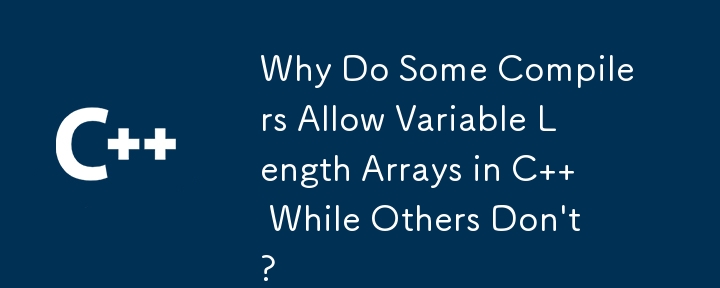

Variable Length Arrays and Constant Expressions
The C code fragment presented below has the potential to compile successfully with certain compilers:
int main()
{
int size = 10;
int arr[size];
}According to the C Standard (8.3.4/1), this code is expected to be rejected since the size of the array (arr) needs to be a constant expression. However, it raises questions about the behavior of compilers like gcc 4.8 and Clang 3.2.
Variable Length Arrays (VLAs) come into play in this scenario. VLAs are a C99 feature that gcc and clang have implemented as an extension within C . However, Visual Studio adheres strictly to the standard in this case. The message it generates:
error C2466: cannot allocate an array of constant size 0
indicates that it rightfully interprets the size as zero, which is not permitted in this context.
If you enable the -pedantic flag in both gcc and clang, you will receive warnings regarding the use of VLAs. For instance, gcc states:
warning: ISO C++ forbids variable length array 'arr' [-Wvla]
int arr[size];
^Moreover, using the -pedantic-errors flag will render this usage an error. Refer to the provided documentation for further information on supported language standards.
The draft C standard defines an integral constant expression in 5.19 (Constant expressions) as follows:
"An integral constant expression is an expression of integral or unscoped enumeration type, implicitly converted to a prvalue, where the converted expression is a core constant expression."
To achieve compliance with the standard, you can initialize size with a literal using const (or constexpr). This would make size an integral constant expression:
const int size = 10; // or constexpr int size = 10;
The corresponding section in the C99 draft standard (6.7.5.2) clarifies that if the size is not present, an incomplete array type is declared. If the size is *, a variable length array type is created without a defined length and can only be used in certain contexts. Otherwise, it's either a regular array type or a variable length array type based on the expression's properties.
The above is the detailed content of Why Do Some Compilers Allow Variable Length Arrays in C While Others Don't?. For more information, please follow other related articles on the PHP Chinese website!
 What to do if memory usage is too high
What to do if memory usage is too high
 How to solve parsererror error
How to solve parsererror error
 Windows 10 startup password setting tutorial
Windows 10 startup password setting tutorial
 Can Douyin sparks be lit again if they have been off for more than three days?
Can Douyin sparks be lit again if they have been off for more than three days?
 What protocols does the ssl protocol include?
What protocols does the ssl protocol include?
 Java rounding method
Java rounding method
 Windows cannot access the specified device path or file solution
Windows cannot access the specified device path or file solution
 Browser compatibility
Browser compatibility




